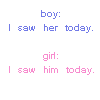အထူးမွတ္ခ်က္။ ။
ၾကိယာ {V} ကုိ ေနာက္ဆုံးမွာ အနက္ျမန္မာျပန္ရသည္။
အထက္ပါ အေျခခံ ၀ါက် {၅}မ်ဳိးသည္ Simple Sentenceတြင္ အျမဲေတြ႕ရမည္ ျဖစ္သည္။
Simple sentenceဆုိသည္မွာ Verbတစ္ခုတည္းသာပါေသာ Sentenceကုိ ေခၚပါသည္။
အေျခခံ၀ါက် {၅}မ်ဳိးအနက္ ပုံစံ {၅}သည္ အေရးၾကီးဆုံး ျဖစ္ျပီး ေနာက္ေတြ႕ရမည့္ Compound/ Complex Sentenceမ်ားတြင္ ျပန္လာလွ်င္ မ်က္စိမရႈပ္ေစရန္ ယခုကတည္းက ရွင္းရွင္းလင္းလင္းျမင္ေစရန္ ၾကည့္ထားေစလုိပါသည္။
Simple Sentence {ၾကိယာ တစ္လုံးတည္းပါ} သည္ စာဖတ္သူ၏ စိတ္ကုိ ရႈပ္ေထြးေစမည္ မဟုတ္ပါ။ Compound Sentenceဆုိသည္မွာလည္း Simple Sentence {၂}ခု သုိ႔မဟုတ္ {၂}ခုထက္ ပုိ၍ေပါင္းေပးထားျပီး သီးျခားစီ အဓိပၸါယ္ေကာက္နဳိင္ပါေသးသည္။
ဥပမာ၊ ၊
We fished all day.
We didn’t catch a thing.
တစ္ေနကုန္ ငါးဖမ္းသည္ တစ္ေကာင္မွ် မမိပါ။
We fished all day; however, we didn’t catch a thing.
တစ္ေနကုန္ ငါးဖမ္းသည္ သုိ႔ရာတြင္ တစ္ေကာင္မွ် မမိပါ။
We fished all day, but didn’t catch a thing.
တစ္ေနကုန္ ငါးဖမ္းသည္။ သုိ႔ေသာ္ တစ္ေကာင္မွ် မမိပါ။
However, butတုိ႔သည္ conjunction စကားဆက္မ်ားျဖစ္သည္။ Conjunctionတြင္ {၂} မ်ဳိးရွိသည္။
1. Co-ordinating Conjunction.
(ကုိယ္႔ဘာသာကုိယ္ ရပ္တည္နိဳင္သည္။)
2. Sub-ordinating Conjunction ဟူ၍ ျဖစ္ပါသည္။
(အျခား၀ါက်ကုိ မွီခုိရသည္။)
Co-ordinating Conjunctionမ်ားကုိ Compound Sentenceတြင္ သုံးပါသည္။ Sub-ondinating Conjunctionမ်ားကုိ Complex Sentenceတြင္ သုံးပါသည္။
Co-ordinating Conjunction, and ဒါေၾကာင္႔/ ႏွင္႔/ ျပီးေတာ႔/ ၍/ ေသာ္လည္း၊ and then အဲဒီေနာက္၊ After that (တစ္ဆက္တည္းျဖစ္ေၾကာင္း ျပသည္။)
But= သုိ႔ေသာ္
Nor= လည္းပဲ (မဟုတ္/ မတတ္နိဳင္/ မျဖစ္….)
Or= သုိ႔မဟုတ္
So= ထုိ႔ေၾကာင္႔
Yet= သုိ႔ေသာ္ {butႏွင္႔ တူ၏}
Either…or တစ္ခုမဟုတ္ အျခားတစ္ခု
Neither…nor တစ္ခုမွမဟုတ္
Not only…but {also/ as well/ too} ထုိမွ်မက/ဤမွ်လည္းပဲ
ဥပမာ၊ ၊ And ပုံစံ…
We were talking and laughing.
ကၽြန္ေတာ္တုိ႔ စကားေျပာ၍ ရယ္ၾကသည္။
He fell heavily and broken his arm.
သူ လဲခဲ႕သည္။ ဒါေၾကာင္႔ လက္က်ဳိးသြားသည္။
(ဤ၀ါက်တြင္ andသည္ soကဲ႔သုိ႔ အနက္အဓိပၸါယ္ေကာက္ရသည္။)
Weed the garden and I’ll pay you 5$.
ဥယ်ာဥ္ကုိ ရွင္းေပးပါ။ ျပီးေတာ႔ {၅}ေဒၚလာ ေပးပါမည္။
Tom is 15 and still sucks his thumb.
တြမ္၁၅ႏွစ္ရွိျပီျဖစ္ေသာ္လည္း လက္မ စုပ္ေသးသည္။
Co-ordinating Conjunctionတြင္ andသည္ ပရိယာယ္ အလြန္မ်ားပါသည္။ and သည္ noun ႏွင္႔ nounျခင္း၊ adjective ႏွင္႔ adjectiveျခင္း၊ verb ႏွင္႔ verbျခင္း၊ adverbႏွင္႔ adverbျခင္း ဆက္ထားသည္။ တစ္ခါတည္းေရာ၍ အဓိပၸါယ္ေကာက္ရမည္။ andေရွ႕ေနာက္ ၀ါစဂၤ{part of speech}ကြဲျပားလွ်င္ သီျခားစီ အဓိပၸါယ္ယူနိဳင္ပါသည္။ (ဆုိလုိသည္မွာ and၏ ေရွ႕က ၀ါက်ႏွင္႔ ေနာက္က၀ါက်ကုိ သီးျခားစီ အဓိပၸါယ္ေကာက္ယူနိဳင္သည္။)
ဥပမာ၊ ၊
I have a book{n} and a pencil{n}.
စာအုပ္ႏွင္႔ခဲတံ ကၽြန္ေတာ္႔မွာ ရွိသည္။
She is beautiful{adj} and clever{adj}.
သူ ေခ်ာ၍ လိမၼာသည္။
He eats the food quickly{adv} and eagerly{adv}.
အစားကုိ ျမန္ျမန္ႏွင္႔ အားပါးတရ သူ စားသည္။
He came home to eat{v} and sleep{v}.
အိပ္ဖုိ႔ႏွင္႔ စားဖုိ႔ သူ ျပန္လာသည္။
He finished lunch{n} and went{v} shopping.
သူ နံနက္စာ စားျပီးေတာ႔ ေစ်းသြားသည္။
ဤေနာက္ဆုံး ၀ါက်တြင္ and၏ ေရွ႕တြင္ lunch {n}ျဖစ္ျပီး၊ ေနာက္တြင္went {v}ျဖစ္ေနသည္။ အဓိပၸါယ္သီးျခားစီ ေကာက္ရမည္။ went၏ ေရွ႕တြင္ Subject{ကတၱား} မရွိ and၏ ေရွ႕က Subject {He}ကုိ ျပန္ယူပါ။ ဤ၀ါက်မ်ဳိး မၾကာခဏ ေတြ႕ရမည္။
04 January 2008
ဂရမ္မာဥယ်ာဥ္ အဆက္ ၂
Labels:
ဂရမ္မာဥယ်ာဥ္ အဆက္ ၂
Subscribe to:
Post Comments (Atom)


 သားေလး! သူမ်ားhappy birthdayဆုိတုိင္း သားေလးေပ်ာ္နိဳင္ပါ႔မလား? သားေလးကလည္း ေပ်ာ္စရာနဲ႔ေတြ႕ရင္ေပ်ာ္လုိက္ၾက၊ ေဆြးစရာနဲ႔ေတြ႕ရင္ လြမ္းေဆြးလုိက္ၾကတဲ႔ ေလာကၾကီးအတြင္းမွာ ေနၾကရတဲ႔ လူသားထဲက လူသားတစ္ေယာက္ပဲဆုိေတာ႔ အေမ႔သားျဖတ္သန္းခဲ႔တဲ႔ အသက္အပုိင္းျခားအတြင္းမွာ ေပ်ာ္စရာအျဖစ္ရရွိခဲ႔တဲ႔ အခ်ိန္ကုိ ေရတြက္လုိ႔ရနိဳင္ပါလိမ္႔မယ္။ ဒါေပမယ္႔ အဆင္မေျပ၊ ျငီးေငြ႕စရာ၊ အလုိမက်စရာအခ်ိန္ေတြကေတာ႔ ေရတြက္လုိ႔ရမယ္မထင္ပါဘူး သားရယ္၊ ဒါေပမယ္႔ အဲဒီအခက္အခဲေတြၾကားကေန..ရသင္႔တဲ႔ဘ၀အႏွစ္သာရတစ္ခုကုိေတာ႔ ရယူသင္႔ပါတယ္ သား။ ဒါမွ သားလူျဖစ္လာရက်ဳိး, ေမေမေမြးရက်ဳိးနပ္မွာေပါ႔ သားေလး...
သားေလး! သူမ်ားhappy birthdayဆုိတုိင္း သားေလးေပ်ာ္နိဳင္ပါ႔မလား? သားေလးကလည္း ေပ်ာ္စရာနဲ႔ေတြ႕ရင္ေပ်ာ္လုိက္ၾက၊ ေဆြးစရာနဲ႔ေတြ႕ရင္ လြမ္းေဆြးလုိက္ၾကတဲ႔ ေလာကၾကီးအတြင္းမွာ ေနၾကရတဲ႔ လူသားထဲက လူသားတစ္ေယာက္ပဲဆုိေတာ႔ အေမ႔သားျဖတ္သန္းခဲ႔တဲ႔ အသက္အပုိင္းျခားအတြင္းမွာ ေပ်ာ္စရာအျဖစ္ရရွိခဲ႔တဲ႔ အခ်ိန္ကုိ ေရတြက္လုိ႔ရနိဳင္ပါလိမ္႔မယ္။ ဒါေပမယ္႔ အဆင္မေျပ၊ ျငီးေငြ႕စရာ၊ အလုိမက်စရာအခ်ိန္ေတြကေတာ႔ ေရတြက္လုိ႔ရမယ္မထင္ပါဘူး သားရယ္၊ ဒါေပမယ္႔ အဲဒီအခက္အခဲေတြၾကားကေန..ရသင္႔တဲ႔ဘ၀အႏွစ္သာရတစ္ခုကုိေတာ႔ ရယူသင္႔ပါတယ္ သား။ ဒါမွ သားလူျဖစ္လာရက်ဳိး, ေမေမေမြးရက်ဳိးနပ္မွာေပါ႔ သားေလး... 













No comments:
Post a Comment